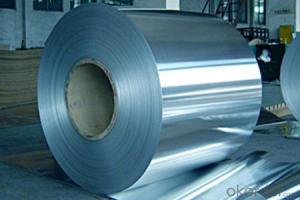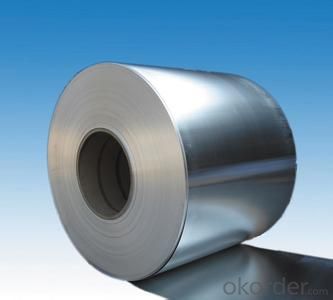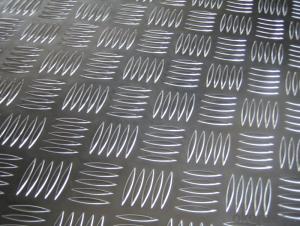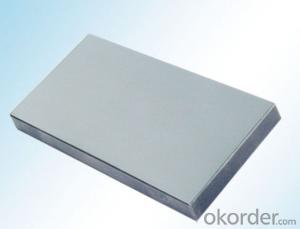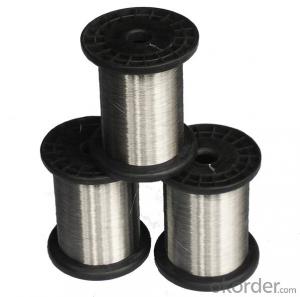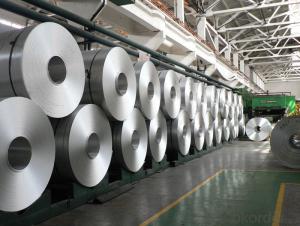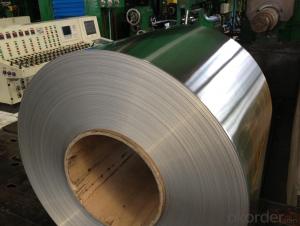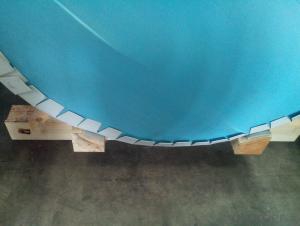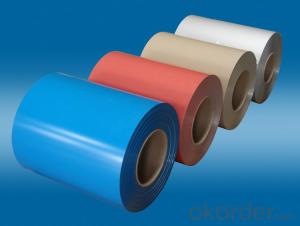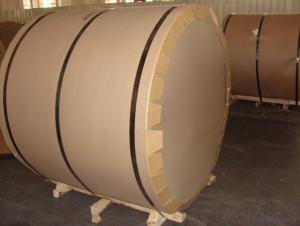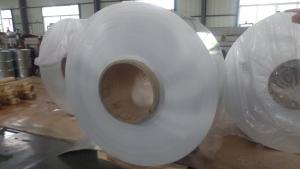5x7 Aluminum Sheets - AA5182 Aluminium Coils for Can End Stock
- Loading Port:
- Shanghai
- Payment Terms:
- TT OR LC
- Min Order Qty:
- 20 m.t.
- Supply Capability:
- 50000 m.t./month
OKorder Service Pledge
OKorder Financial Service
You Might Also Like
Specification
1.Structure of Aluminium Can End Stock
Aluminium Coils for aluminium can end stock is one semi-finished aluminium material. This strip can be used to produce aluminium tab for beverage can. The alloy AA5182 is widly used in can tab, end and can body. Its weight is much lower than steel. So many customers choosed aluminium material instead of steel.
2. Main features of Aluminium Can End Stock
a.Competitive price---We have our own mills and can produce mill finished aluminium coils, so we can control the production cost better.
b.Professional after-sale service---We have more than 15 years exportation experience and you need not worry about the exporation problems.
c.Fast delivery time---We can control the delivery time within 35 days.
3. Image of Aluminium End Stock
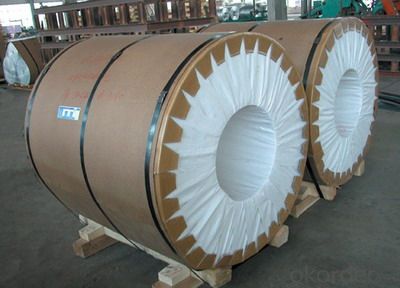
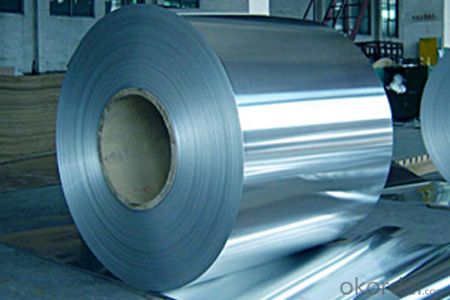
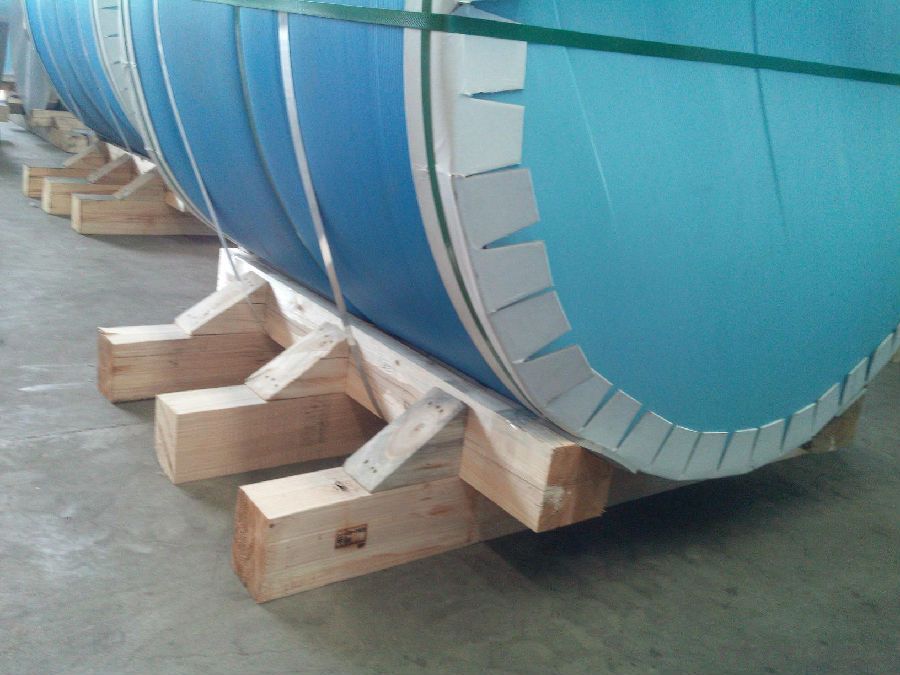
4. Product Specification of Aluminium End Stock
| Alloy | Temper | Thickness | Width | Weight |
| AA5182 | H19 | 0.22mm-0.26mm | 600mm-2000mm | 2tons |
5.FAQ of Aluminium End Stock
What is the quality standard?
---Usually our standard is GB3880-2006
What is the largest width?
---It is 2300mm
What is the MOQ?
---Usually we can accept 20 tons.
- Q: Can aluminum sheet be painted?
- Certainly, painting aluminum sheet is possible. However, it is crucial to adequately prepare the surface beforehand to guarantee strong paint adhesion and long-lasting results. Typically, this involves thoroughly cleaning the aluminum sheet to eliminate any dirt, grease, or oxidation. Subsequently, a primer is applied to enhance adhesion. Once the primer has dried, you can proceed with applying your desired paint. For optimal outcomes, it is recommended to select a high-quality paint suitable for metal surfaces. Moreover, if the aluminum sheet will be exposed to outdoor conditions, it is advisable to utilize a paint specifically designed for exterior use. This will ensure protection against weathering and corrosion.
- Q: What are the standard sizes of aluminum sheets?
- The standard sizes of aluminum sheets can vary depending on the manufacturer and specific requirements. However, some commonly available standard sizes for aluminum sheets include 4 feet by 8 feet (1.2 meters by 2.4 meters), 4 feet by 10 feet (1.2 meters by 3 meters), and 5 feet by 10 feet (1.5 meters by 3 meters). These sizes are widely used in various industries and are readily available in the market. Additionally, custom sizes can also be obtained through specialized aluminum sheet suppliers to meet specific project needs.
- Q: Can aluminum sheet be used for medical applications?
- Yes, aluminum sheet can be used for certain medical applications. It is commonly utilized in medical equipment, such as imaging machines, as it is lightweight, durable, and has good electrical conductivity. However, it is important to note that aluminum's use in direct contact with the human body or in implants is limited due to potential health concerns and the availability of more suitable materials.
- Q: How much is a square inch of a millimeter aluminum plate?
- The weight of 2.73 kg / square meter5 Series refers to magnesium as the main alloy element, that is, aluminum magnesium alloy.
- Q: only aluminum source i have is mountain dew cans any way to turn them quickly into a powder?or any other ideas?
- Let me guess, making thermite? :P The easiest way by far to get aluminum I have found is breaking open an old EtchaSketch. That's aluminum powder in there. There are too many impurities on the can to make it easy, go to the dump and find some old EtchaSketches. Addition: Do NOT breathe in the powder, its not good for your system, it does large amounts of damage to your lungs, I suggest wearing a mask of some sort for safety. Do not take it lightly. Otherwise, have fun melting holes in the ground / someone's car / a safe / anything else you can get your hands on :P
- Q: What are the different methods of surface treatment for adhesive bonding of aluminum sheet?
- Aluminum sheet adhesive bonding can be enhanced through various surface treatment methods. These methods aim to improve the strength and durability of the adhesive joint. Some commonly employed techniques include: 1. Enhancing mechanical interlock: One approach involves roughening the aluminum surface using sandblasting, abrasion, or wire brushing. This creates a stronger mechanical interlock between the adhesive and the aluminum, ultimately increasing bond strength. 2. Chemical treatment for surface improvement: Chemical treatments can eliminate contaminants, oxidation, or corrosion from the aluminum surface. Acid etching, chromate conversion coating, or anodizing are commonly used methods. These treatments enhance surface cleanliness and promote adhesion by creating a chemically reactive surface for the adhesive. 3. Plasma treatment: Exposing the aluminum surface to a low-temperature plasma discharge modifies the surface energy and eliminates contaminants. This treatment enhances the adhesive's wettability and adhesion. 4. Primer coating: Applying a primer coat on the aluminum surface facilitates chemical bonding between the adhesive and the substrate. Primers are designed specifically to enhance adhesion to certain substrates, thereby improving bond strength and durability. 5. Surface activation: Techniques like flame treatment or corona treatment can increase the surface energy of the aluminum sheet. These methods generate free radicals on the surface, thereby improving the adhesive's bonding characteristics. It's worth noting that the choice of surface treatment method depends on factors such as the specific adhesive used, desired bond strength, application requirements, and the condition of the aluminum surface. It is advisable to consult adhesive manufacturers or experts to determine the most suitable surface treatment method for a particular adhesive bonding application.
- Q: What kind of paint should be sprayed on the aluminium board?
- General use of Japanese Oriental metal paint can be produced, if the landlord can provide information about the use. You can provide better solutions to you
- Q: What are the standard sizes and availability of aluminum sheets in the market?
- The sizes and availability of aluminum sheets in the market can vary depending on the location and specific requirements. Nevertheless, there are generally available sizes that can be found in most markets. In terms of thickness, aluminum sheets are commonly found in the range of 0.02 to 0.2 inches (0.5 to 5 millimeters). Thinner sheets (0.02 to 0.06 inches) are often utilized for lightweight purposes such as signage or crafts, while thicker sheets (0.1 to 0.2 inches) are typically employed for more heavy-duty applications like construction or industrial use. Regarding width and length, standard sizes of aluminum sheets are often offered in 4 feet by 8 feet (48 inches by 96 inches) or 4 feet by 12 feet (48 inches by 144 inches). These dimensions are widely available and suitable for various applications. However, it is important to note that custom sizes can also be ordered or cut from larger sheets to meet specific project requirements. Aluminum sheets can be found in various locations, including local hardware stores, metal suppliers, and online marketplaces. It is always advisable to check with local suppliers or conduct online research to determine the specific sizes and availability in your area. Additionally, different grades or alloys of aluminum may have varying availability, so it is crucial to consider the specific requirements of your project when sourcing aluminum sheets.
- Q: is putting Aluminium foil behind the wind shield actually generate more heat and make the car hotter inside or make the car inside cooler? assume you put foil behind all windows.
- it does it is just too thin to hold the heat once the heat source has been removed
- Q: 1995 s10 I took this whole thing apart and marked and labled everything. Now i have an aluminum head sitting on a bucket that was spraying water right from the head gasket but the head gasket is in perfect shape, and there are no cracks i can see on the head. One more thing, the truck would not start up with water in it, but it would when it was drained, like it was blocking the spark or something. yes it did overheat has this ever happened to anyone else, and any ideas? Thank you.
- its not the head gasket, thats what i had thought too. its actually the intake manifold gasket. GM did not design them to resist DEXCOOL, so they disintegrate in a few years. Gm had a lawsuit concerning this. You need to remove the intake manifold if you haven't already and replace the gaskets with quality gaskets from autozone. You will need to remove the distributor, so be sure to mark it. good Luck might be a good idea to replace all hoses, and water pump while your at it
Send your message to us
5x7 Aluminum Sheets - AA5182 Aluminium Coils for Can End Stock
- Loading Port:
- Shanghai
- Payment Terms:
- TT OR LC
- Min Order Qty:
- 20 m.t.
- Supply Capability:
- 50000 m.t./month
OKorder Service Pledge
OKorder Financial Service
Similar products
Hot products
Hot Searches
Related keywords
